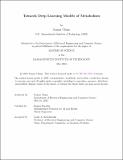Towards Deep Learning Models of Metabolism
Author(s)
Chinn, Itamar
DownloadThesis PDF (1.943Mb)
Advisor
Barzilay, Regina
Terms of use
Metadata
Show full item recordAbstract
Enzymes play a critical role in catalyzing the chemical reactions that underpin metabolic processes in living organisms. Despite their importance, a vast majority of enzymes remain uncharacterized, limiting our understanding of their potential roles in metabolism and disease. This thesis aims to address this gap by leveraging recent advancements in protein and molecular modeling to predict the outcomes of enzymatic reactions and identify functions of unannotated enzymes. Two key contributions are highlighted. Firstly, a graph-based forward synthesis prediction model is introduced, which relies only on the molecular structure of the substrates and the enzyme’s primary sequence. By capturing the biochemical interaction between enzyme residues and substrate atoms, the model achieves better generalization to new chemistry, demonstrating significant improvements in predicting unseen products and showcasing its potential for drug metabolism prediction. The second contribution is CLIPZyme, a contrastive learning method for virtual enzyme screening that frames the task of identifying enzymes catalyzing a reaction of interest as a retrieval problem. CLIPZyme outperforms the baseline approach of screening enzymes via their enzyme commission (EC) number. The combination of CLIPZyme with EC prediction consistently yields improved results over either method alone. Both of these contributions aim to provide the initial building blocks to model entire complex metabolic networks with downstream applications including metabolic engineering and drug discovery.
Date issued
2024-05Department
Massachusetts Institute of Technology. Department of Electrical Engineering and Computer SciencePublisher
Massachusetts Institute of Technology